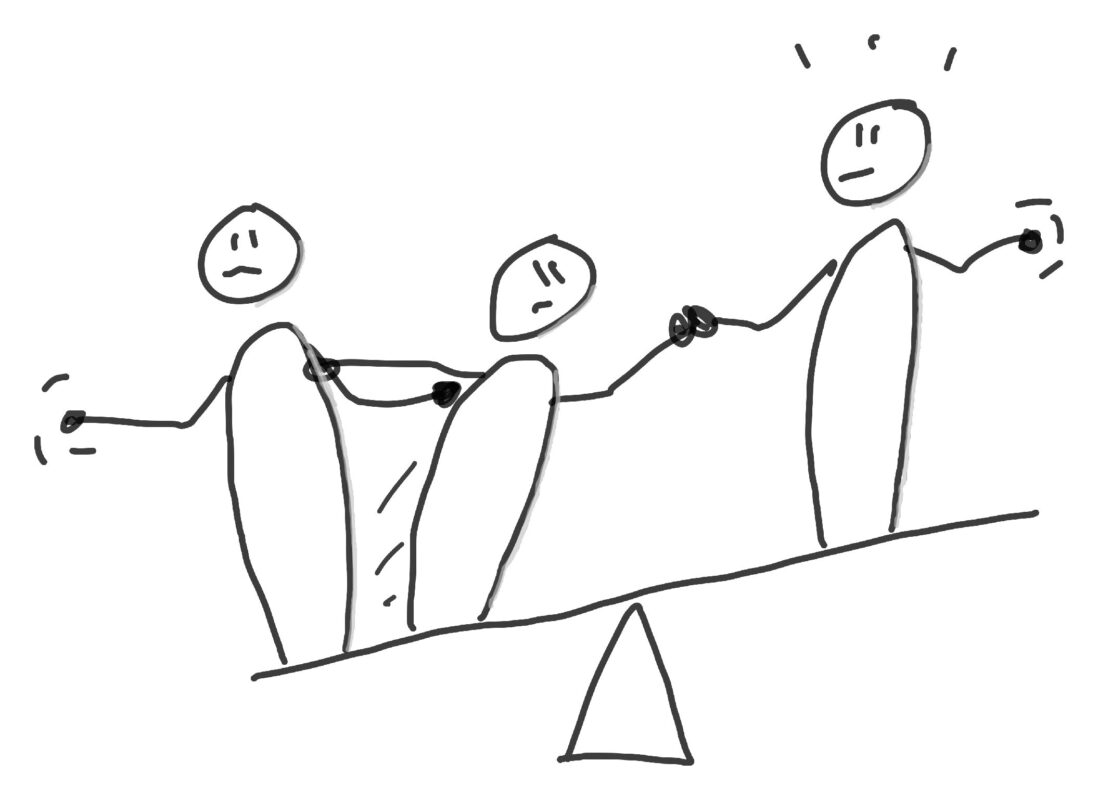Working together is embracing imbalance
When we think of cooperation, the image of balance often comes to mind: a team working together in harmony and balancing tasks. But is that really the essence of cooperation? Or is it precisely the imbalance that drives cooperation? A well-cooperating team is not necessarily a team in balance, but a team that understands and embraces the dynamics of imbalance. That stands up as soon as something gets out of balance and says: "Come on, what can I do?"
An interesting thought comes from an Amsterdam professor of microbiology, who once remarked that the essence of life is not balance, but imbalance. He explained that a cell lives because processes are constantly taking place to repair imbalances: lack of oxygen, removal of waste products, replenishment of energy. Once a cell is in balance, this process stops-the balance is achieved and the cell dies. His thesis: "Life is imbalance."
This thought goes to the heart of cooperation. Just as a cell lives by repairing imbalances, cooperation lives by working together to balance ever-changing conditions.
Disbalance as an engine of cooperation
Every cooperation starts with a challenge: a project, a goal or a problem to be solved. This always involves imbalance. A team that cooperates successfully does not see imbalance as a problem, but as an opportunity. It understands that every action creates new imbalances, and that this is precisely what constitutes the vibrancy of cooperation.
Consider, for example, organising a training course. It seems to be a success: the training has been sold! But soon the associated imbalances arise. Is a trainer available? Where will the training take place? Are the necessary materials arranged? Each resolved issue leads to a new challenge that demands action. In a well-cooperating team, these imbalances are addressed, not as problems, but as a natural consequence of success.
One app, and there is a trainer. One phone call, and the venue is arranged. Of course, that too can create another challenge, the trainer may not live nearby, but the team keeps moving, solving and supporting.
Working together in three worlds
Within the Scale of Cooperation, we see three worlds in which teams can operate: Survive, Escape and Cooperate. Each of these worlds deals with (dis)balance in a different way:
- Avoiding
Here, imbalance is often not visibly addressed. Team members work on their own islands, follow procedures or perform tasks without really working together. The team feeling is missing, and growth is limited to what individuals can handle. The focus is on avoiding new imbalances, causing cooperation to stagnate. This leads to sham balance, making everything seem in order until a change is needed or different behaviour is required from the team. - Struggling
Under high pressure, imbalances can lead to frustration and resistance. Conflict arises over what is and is not important, and the imbalances pile up. The struggle for control and safety hinders cooperation and traps the team in a vicious circle of distrust and irritation. Disbalances are actively disqualified in the hope of ending up on the right side of the balance themselves. - Cooperating
In this world, disbalances are embraced as opportunities. Team members work together to solve challenges, keeping in mind both the team goal and everyone's individual contribution. People are aware that balancing something always creates a new imbalance in another place too. This is where cooperation lives, driven by trust and shared responsibility. Disbalances are not perceived as negative, but as the engine that moves the team forward. We speak of functional imbalance here.
Embracing imbalance as cooperation in action
What can we learn from the idea that life imbalance is? A team that embraces imbalance understands that working together means constant balancing. It is not the absence of challenges, but the ability to stand up together and tackle those challenges. This is not just about the tasks, but also the energy, spirit and direction within the team.
Sometimes a team feels the need to "do everything differently" to achieve better cooperation. But perhaps it is actually more powerful to embrace the routine of what is going well. From that stability, space is created for real improvements, without creating too much imbalance which can create strife or frustration.
How does your team embrace imbalance?
What happens in your team when the balance gets upset?
What routines help you solve imbalances?
What are currently the main imbalances in your team that should be addressed?
And how can you further develop embracing imbalance as a team?
Disbalance brings a cooperation to life. It creates movement, growth and connection, as long as the team is willing to balance together. From the Scale of Cooperation, we support teams in embracing imbalance, focusing on both routines and improvements. Because every action brings new challenges, and embracing them is what really brings teams together.

